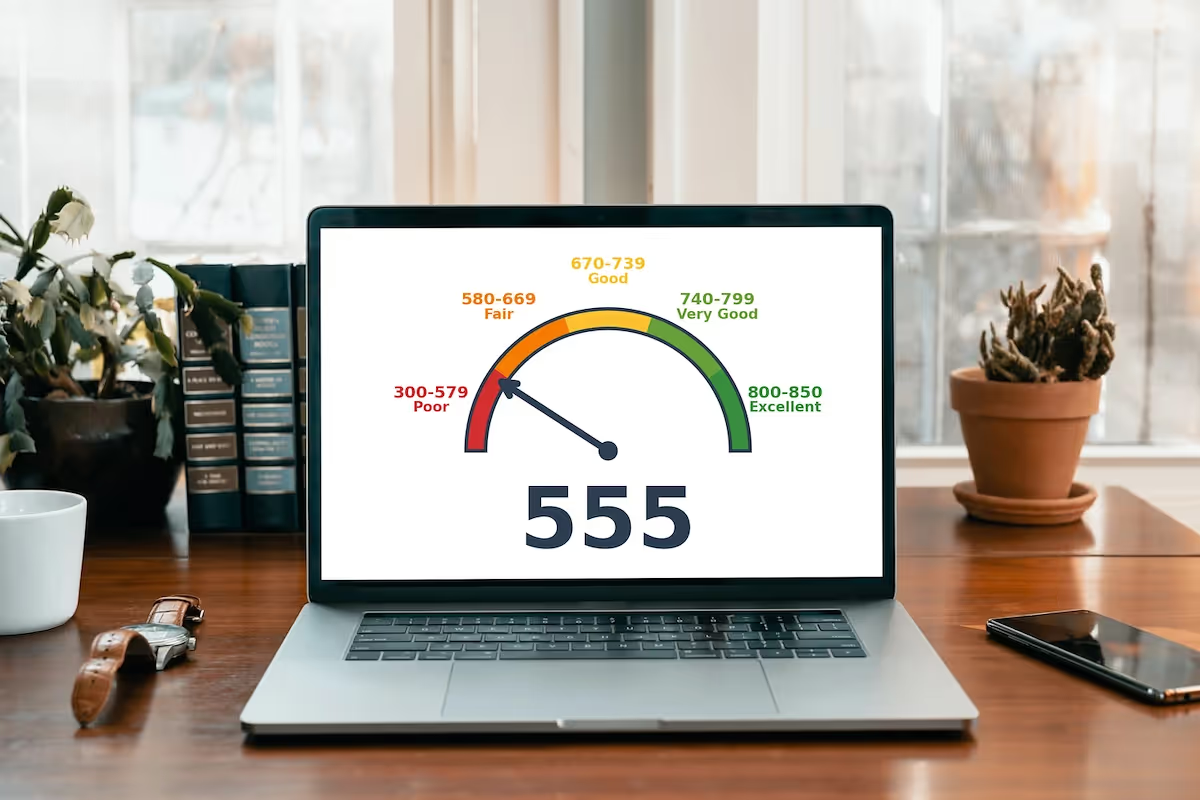
Kudos has partnered with CardRatings and Red Ventures for our coverage of credit card products. Kudos, CardRatings, and Red Ventures may receive a commission from card issuers. Kudos may receive commission from card issuers. Some of the card offers that appear on Kudos are from advertisers and may impact how and where card products appear on the site. Kudos tries to include as many card companies and offers as we are aware of, including offers from issuers that don't pay us, but we may not cover all card companies or all available card offers. You don't have to use our links, but we're grateful when you do!
555 Credit score: What You Need to Know in 2025
July 1, 2025


TL;DR
A 555 credit score is a foundational starting point for building a stronger financial future, though it falls within the "poor" range on the FICO scale. Think of it not as a setback, but as a clear opportunity to improve your standing and unlock more favorable financial products down the road.
What Does a 555 Credit Score Mean?
A credit score of 555 places you in the "poor" category on the widely used FICO Score scale, which ranges from 300 to 850. To lenders, this number indicates a significant level of risk, often reflecting a history of credit management challenges. It suggests to financial institutions that you might have trouble repaying future debts, which heavily influences their willingness to lend you money.
Financially, a 555 score can be restrictive. You may struggle to get approved for new loans or credit cards, and any offers you do receive will likely come with high interest rates and less-than-ideal terms. This makes major purchases more expensive and can limit your options. However, knowing where you stand is a crucial first step toward improving your credit outlook.
Who Has a 555 Credit Score?
Credit scores generally improve with age, as individuals have more time to build a positive payment history and establish financial stability. According to 2023 Experian data, the average FICO score varies significantly across different generations:
- Generation Z (ages 18-26): 680 (Good)
- Millennials (ages 27-42): 690 (Good)
- Generation X (ages 43-58): 709 (Good)
- Baby Boomers (ages 59-77): 745 (Very Good)
- Silent Generation (ages 78+): 760 (Very Good)
Credit Cards With a 555 Credit Score
A credit score of 555 falls into the "poor" credit range, which can significantly limit your options when applying for a new credit card. Most mainstream lenders view this score as high-risk, meaning you're likely to face rejections for standard unsecured cards that offer rewards or low interest rates. Your best bet will likely be secured credit cards or unsecured cards specifically designed for building credit, which often come with higher fees and interest rates.
To navigate these limited options, a service like Kudos uses AI-powered tools to match your preferences against its database of nearly 3,000 cards. The platform provides personalized recommendations and credit score insights, helping you understand the potential impact of a new card and make a more informed decision.
Auto Loans and a 555 Credit Score
A 555 credit score places you in the subprime lending category, meaning that while you can likely still get approved for an auto loan, you should expect to face significantly higher interest rates. According to recent auto finance data, these less favorable terms will result in a more expensive loan and higher monthly payments compared to borrowers with better credit.
- Super-prime (781-850): 5.25% for new cars, 7.13% for used cars
- Prime (661-780): 6.87% for new cars, 9.36% for used cars
- Non-prime (601-660): 9.83% for new cars, 13.92% for used cars
- Subprime (501-600): 13.18% for new cars, 18.86% for used cars
- Deep subprime (300-500): 15.77% for new cars, 21.55% for used cars
Mortgages at a 555 Credit Score
A 555 credit score significantly limits your mortgage options, but it doesn't completely rule out homeownership. You will not qualify for a conventional loan. Your most viable path is likely an FHA loan, provided you can make a down payment of at least 10%. While some lenders may consider VA or USDA loans on a case-by-case basis, most require higher credit score minimums.
If you secure a loan, your credit score will result in less favorable terms. Lenders view a 555 score as high-risk, leading to higher interest rates and fees. You will also face stricter underwriting, where lenders scrutinize your entire financial profile more intensely, and may be subject to limited loan sizes.
What's in a Credit Score?
Understanding your credit score can feel like trying to solve a complex puzzle, as it's a blend of several key financial habits. The most common factors that determine your score include:
- Your payment history tracks whether you have paid past credit accounts on time.
- Credit utilization is the percentage of your available credit that you are currently using.
- The length of your credit history considers the age of your oldest account and the average age of all your accounts.
- Credit mix refers to the variety of credit products you have, such as credit cards, retail accounts, and loans.
- New credit inquiries and recently opened accounts can also temporarily impact your score.
How to Improve Your 555 Credit Score
Improving your credit score is an achievable goal that requires consistent, strategic effort. No matter your starting point, taking the right steps can help you build a healthier credit profile.
- Establish automatic bill payments. Since payment history is the single most important factor in your credit score, ensuring every bill is paid on time is the best way to start building a positive record and prevent your score from dropping further.
- Reduce your credit utilization ratio. Aim to use less than 30% of your available credit, as high balances can significantly lower your score. Paying down debt is a powerful way to improve this crucial scoring factor.
- Monitor your credit reports. Regularly check your reports from all three bureaus for inaccuracies or signs of fraud that could be unfairly damaging your score. Disputing errors can lead to a quick and significant score increase.
- Become an authorized user. Being added to the credit card of someone with a long history of on-time payments and low utilization can add their positive history to your report. This can help improve your score by lengthening your credit history and lowering your overall utilization.
Using a tool like Kudos can also help you make smarter credit card choices to maximize rewards and manage your spending effectively.
Unlock your extra benefits when you become a Kudos member

Turn your online shopping into even more rewards

Join over 400,000 members simplifying their finances

Editorial Disclosure: Opinions expressed here are those of Kudos alone, not those of any bank, credit card issuer, hotel, airline, or other entity. This content has not been reviewed, approved or otherwise endorsed by any of the entities included within the post.



































.webp)


.webp)






